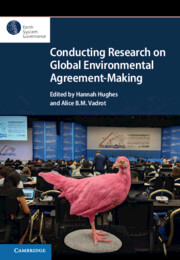Book contents
- Conducting Research on Global Environmental Agreement-Making
- Series page
- Conducting Research on Global Environmental Agreement-Making
- Copyright page
- Dedication
- Contents
- Figures, Tables and Boxes
- Contributors
- Preface
- Acknowledgements
- Abbreviations
- 1 Introduction
- Part I Developing a Methodology
- Part II Navigating Sites
- Part III Collecting and Analysing Data
- 8 Texts
- 9 Interviews
- 10 Ethnography
- 11 Collaboration
- 12 Networks
- Part IV Implementing and Adapting
- Index
- References
9 - Interviews
Conducting and Using Interviews on and at Negotiations
from Part III - Collecting and Analysing Data
Published online by Cambridge University Press: 07 August 2023
- Conducting Research on Global Environmental Agreement-Making
- Series page
- Conducting Research on Global Environmental Agreement-Making
- Copyright page
- Dedication
- Contents
- Figures, Tables and Boxes
- Contributors
- Preface
- Acknowledgements
- Abbreviations
- 1 Introduction
- Part I Developing a Methodology
- Part II Navigating Sites
- Part III Collecting and Analysing Data
- 8 Texts
- 9 Interviews
- 10 Ethnography
- 11 Collaboration
- 12 Networks
- Part IV Implementing and Adapting
- Index
- References
Summary
Interviewing is widely used as a method for obtaining data in research on global environmental negotiations. Interviewing in this context, however, is beset with perils and pitfalls that can befall the unsuspecting researcher new to the setting. This chapter discusses how interviews can support the study of environmental agreement-making. It first explains different types of research interviews and then guides the researcher through various stages of interviewing, offering practical tips and suggestions. The chapter explains the specifics of interviewing at and on negotiation sites, sampling approaches, access to respondents, interviewer’s effect, conduct of the interview, interview data analysis, and research ethics considerations. The chapter also recounts the author’s experiences of interviewing for PhD research on the IPCC in 2006–2009, as well as including two reflection boxes by Alice Vadrot on oral history interviews and narrative interviews as alternative approaches in the study of global environmental agreement-making.
- Type
- Chapter
- Information
- Conducting Research on Global Environmental Agreement-Making , pp. 168 - 185Publisher: Cambridge University PressPrint publication year: 2023



